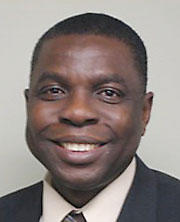Grantee Spotlight: Dr. Kolawole Okuyemi - Improving Cervical Cancer Screening Attitudes of African Immigrants and Refugees
, by CRCHD Staff
Kolawole Okuyemi, M.D., M.P.H., has devoted his career to improving the health of racially and ethnically diverse and other underserved populations using culturally tailored interventions. His current pursuits involve examining cervical cancer screening rates and screening behaviors among African immigrant and refugee women in urban areas of Minnesota. His research is funded by a Community Networks Program Center (CNCP) U54 grant from NCI/CRCHD.
In the Minneapolis and St. Paul areas, there are more than 70,000 African immigrant women, including Ethiopians, Nigerian, and Somali, who have never been screened for cervical or breast cancer. Among the Somali women Okuyemi surveyed in his study, only one third of them (aged 32 and older) had received a Pap test, compared to 63 percent of other immigrant groups in the study.
For many African immigrants, cancer is a foreign topic. For example, there is no word in the native Somali language to describe “cervix” or “cancer.” Also in many African countries, cervical cancer is less likely to be a cause for concern because the typical lifespan is up to 50 years, too young for most to experience the disease.
“In the African way of thinking, there is no reason to get screened for a disease you don’t have,” said Okuyemi. However, African immigrants in the U.S. typically live longer than they would in their native land, making it necessary for them to get breast and cervical cancer screenings.
Okuyemi believes the keys to improving cancer screening rates among African immigrants include 1) building trust and partnerships with community leaders and the African immigrant community; 2) using African interpreters to make prevention and screening understandable; 3) respecting the values and culture of the women; and 4) involving husbands in family health care. These guidelines also steer him in other research pursuits, as director of both the Minnesota Center for Cancer Collaborations and the Program in Health Disparities Research at the University of Minnesota.
In 2010, Okuyemi was named one of the top five NIH-funded researchers in family medicine and received an NCI Cancer Health Disparities Education and Career Development Program Grant for training predoctoral and postdoctoral fellows in interventions to reduce cancer among disadvantaged populations. He is a graduate from the University of Ilorin, Nigeria (M.D.) and the University of Kansas Medical Center in Kansas City (M.P.H.), and he has authored more than 100 peer-reviewed scientific articles and book chapters. Currently, Okuyemi is conducting an NCI R01-funded study addressing smoking cessation in homeless populations.
Resources:
- Learn more about cervical cancer
